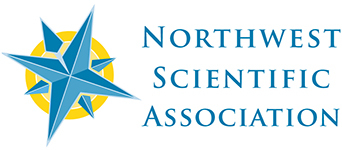Northwest Science will remove barriers to open access publication under future BioOne pilot
Northwest Science will participate in the BioOne Subscribe to Open (S2O) program from January 2026. This pilot program will provide authors with open access publication at greatly reduced cost and enable free-of-charge access to current-year Northwest Science articles.
New members of the NWSA Board of Directors
Five new members join NWSA's Board of Directors after recent elections. Welcome to Brooke Bain-White, Dylan Fischer, Andrew Merschel, Richard Waitt, and Dana Warren!
Plenary talks at NWSA 2025
NWSA is pleased to announce the second in our plenary talk series for the 2025 NWSA Annual Meeting!
Dr. Katharine Cashman, University of Oregon:
"The Onset and Impacts of the c.7700 ybp eruption of Mount Mazama (Crater Lake), OR"
Student Grant Competition
The 2025 NWSA Student Grant Competition is now open! For 2025, our student grants consist of financial support of up to $1,500 for students to attend and present their research at the NWSA Annual Meeting in Eugene, OR, from 17th - 20th March, 2025.
Submit your application using our Student Travel Grant Application Form by Monday 20th, January, 2025!
Dana Warren joins the Northwest Science Editorial Board
The Northwest Science editorial community gained a new member for this Fall. For anyone who missed the social media announcement, Dr. Dana Warren will serve as Associate Editor for Aquatic Biology. Currently an Associate Professor in the Department of Forest Ecosystems and Society at Oregon State University, Dana has worked on aquatic biology and ecology in the Pacific Northwest for over 15 years, bringing a wealth of regional disciplinary experience to Northwest Science.
In recognition of Dr. Kenneth Hammond, NWSA Life Member
The NWSA Board of Directors wishes to recognize Dr. Kenneth Hammond (1934 – 2024), NWSA Honorary Life Member, who sadly passed away on Tuesday, May 21, 2024. Dr. Hammond (Ken) was a scientist, a passionate educator, and a contributor to the advancement of science in the Northwest through service to the NWSA and in other fora.
NWSA Annual Meeting 2025!
The 2024 Northwest Scientific Association Annual Meeting is only just in the rear-view mirror, but we are excited to announce the dates of our next Annual Meeting.
For 2025, the NWSA Annual Meeting will take place on March 18th and 19th in Eugene, OR, where we will be hosted by the University of Oregon. As normal, we anticipate an additional day for field trips.
2024 Annual Meeting registration is open!
Registration for 94th Annual Meeting of the NWSA is now open! Special rates are available for NWSA members, students, and tribal members.
Abstract submission open for the 2024 NWSA Annual Meeting
The 94th Annual Meeting of the Northwest Scientific Association will take place from May 20 - 23, in Spokane, WA, and we are now accepting abstracts for oral and poster presentations. Abstracts may address any of the subjects and disciplines encompassed by NWSA. We also invite contributions to the following special sessions (see the Call for Abstracts).
NWSA Student Grant Competition will not occur in 2024
Regrettably, there will be no NWSA Student Research Grant competition in 2024. In previous years, the NWSA has awarded up to $750/$1500 per student in support of promising research proposals at the undergraduate/graduate levels. After a turbulent financial year, the Association will be pausing the Student Research Grant for 2024. The was a difficult decision to take, and we very much hope to resume the award in 2025.
Northwest Scientific Association

